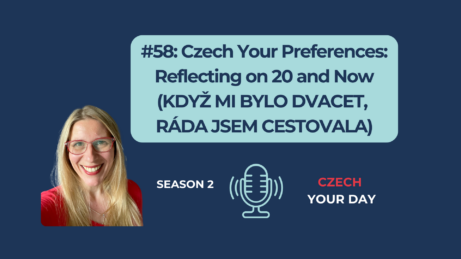Episode 47 (daily podcast CZECH YOUR DAY) transcript included

THIS WEEK’S TOPIC: MONTHS/MĚSÍCE
THE TRANSCRIPT/HANDOUT IS DOWN BELOW
Understanding the Czech Months
You may have already learned the basic forms of Czech months, but today we’re focusing on how to say „in“ a particular month, such as „in June“ or „in December.“ While this might initially appear intimidating, it’s a straightforward adjustment that you’ll master quickly.
A Strategy for Learning
If you haven’t learned the months yet, start by focusing on three. Progressing slowly is better than not progressing at all. By dedicating a few minutes each day this week to learning three months, you’ll be speaking all twelve months in Czech by the end of the week. That’s genuine progress!
- V lednu
- In January
- V únoru
- In February
- V březnu
- In March
- V dubnu
- In April
- V květnu
- In May
- V červnu
- In June
- V červenci
- In July
- V srpnu
- In August
- V září
- In September
- V říjnu
- In October
- V listopadu
- In November
- V prosinci
- In December
Grouping the Months
In Czech, the months can be categorized into three groups based on their endings.
- The First Group
- September: „V září“ (no change)
- English: In September
- The Second Group
- Months ending in -ci: July and December
- „V červenci“ (in July) and „V prosinci“ (in December)
- The Third Group
- All other months
- These months typically end with -u, such as „únor“ becoming „v únoru“.
- English: In February
Some months may include a disappearing vowel when using the preposition „in“. For instance, „květen“ loses the „e“ to become „v květnu“. Can you find more months like that?








